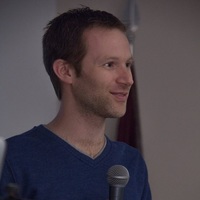- Washington Adventist University, Religion, Adjunctadd
- Historical Research Specialist with ASTR at the General Conference of SDA. Andrews University--2019. PhD in systematic/philosophical theology, focus on freedom and time. Midd... moreHistorical Research Specialist with ASTR at the General Conference of SDA.
Andrews University--2019. PhD in systematic/philosophical theology, focus on freedom and time.
Middle East University--202?. MA in Islamic Studies, focus on missiology and apocalypticism.
Andrews University--2012. MA in Religion, focus on philosophical theology and church history.
Andrews University--2005. BA in History and Religion.edit
Introduction The purpose of this article is to articulate four of the primary features of the relationship between American Christianity and the major current socio-political worldviews popular within the American context. The four... more
Introduction The purpose of this article is to articulate four of the primary features of the relationship between American Christianity and the major current socio-political worldviews popular within the American context. The four features are–1) our historically unique secular polarization in America, 2) the division in American religion reflecting that polarization, 3) the place of Adventism within this complex socio-political web, and 4) the role of America within the rising importance of globo-Christianity, or a Christianity that is explicitly focusing on global concerns. To sum up this article in brief, I will establish that there is a unique relationship between religion and politics in America with potentially philosophically significant implications for the corporate identity of Seventh-day Adventism that continually place us at risk of becoming “entangled” within the spider web of socio-political ideologies. Before proceeding, a few prefatory remarks may be helpful to expl...
Research Interests:
Research Interests:
Scripture. Philosophy. What do they have in common? Many have wondered how philosophical reflection can be harmonized with reading the Bible as the Word of God. Canale has made it his lifelong passion to show how extrabiblical and... more
Scripture. Philosophy. What do they have in common? Many have wondered how philosophical reflection can be harmonized with reading the Bible as the Word of God. Canale has made it his lifelong passion to show how extrabiblical and philosophical presuppositions do indeed impact the theology we draw out from the Scriptures, most often in ways incompatible with a close reading of the text. Suggesting a reversal in our method, by restructuring how we go about reading Scripture, he claims we need to let the Word of God reveal its own philosophical presuppositions. In this way Canale hopes to encourage the completion of the Protestant Reformation's return to Scripture. In the following essays honoring Canale's ministry of teaching and scholarship, a group of those inspired by his work enter into a dialogue with him as they explore the relation between Scripture and philosophy. We invite our readers to wrestle honestly as they seek to dwell fully upon the Word of God in their love of wisdom as we await and prepare for the Second Coming of Christ.
Research Interests: Philosophy and Bible
Research Interests:
THE THEOLOGICAL SIGNIFICANCE OF THE RELATIONS OF FREEDOM AND TIME IN THE SCIENCES AND HUMANITIES: AN EVALUATION OF THE CONTRIBUTIONS OF DAVID BOHM AND PAULI PYLKKÖ by Michael F. Younker Adviser: Martin Hanna ABSTRACT OF GRADUATE STUDENT... more
THE THEOLOGICAL SIGNIFICANCE OF THE RELATIONS OF FREEDOM AND TIME IN THE SCIENCES AND HUMANITIES: AN EVALUATION OF THE CONTRIBUTIONS OF DAVID BOHM AND PAULI PYLKKÖ by Michael F. Younker Adviser: Martin Hanna ABSTRACT OF GRADUATE STUDENT RESEARCHOF GRADUATE STUDENT RESEARCH
Research Interests:
Complexity: Scientific Perspectives on Divine Action, Robert John Russell, Nancey Murphy, and Arthur R. Peacocke, eds., (Vatican Observatory Publications: Vatican City, 1997); Keith Ward, Divine Action: Examining God’s Role in an Open and... more
Complexity: Scientific Perspectives on Divine Action, Robert John Russell, Nancey Murphy, and Arthur R. Peacocke, eds., (Vatican Observatory Publications: Vatican City, 1997); Keith Ward, Divine Action: Examining God’s Role in an Open and Emergent Universe (Radnor, PA: Templeton Foundation Press, 2007); and Anna Case-Winters, “Rethinking Divine Presence and Activity in World Process,” in Thomas Jay Oord, ed., Creation Made Free: Open Theology Engaging Science (Eugene, OR: Pickwick Publications, 2009). See Sir Isaac Newton, Principia: The System of the World, Vol. II, trans. Motte and 2
